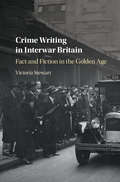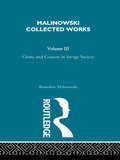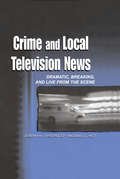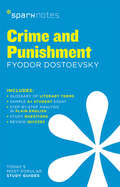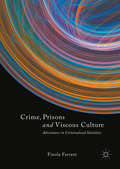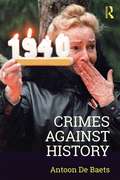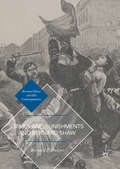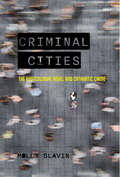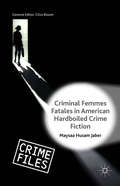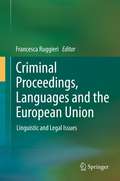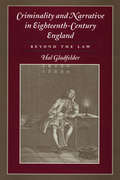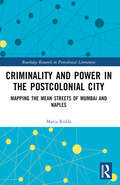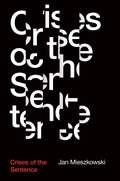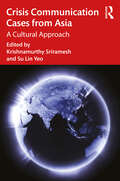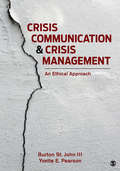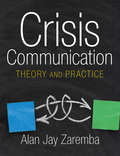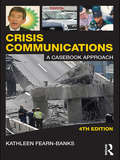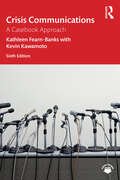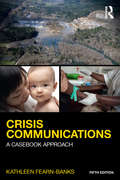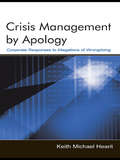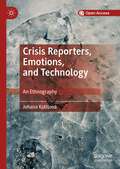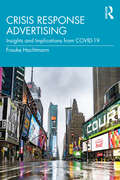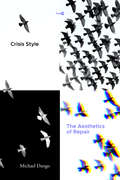- Table View
- List View
Crime Writing in Interwar Britain: Fact and Fiction in the Golden Age
by Victoria StewartThe interwar period is often described as the 'Golden Age' of detective fiction, but many other kinds of crime writing, both factual and fictional, were also widely read during these years. Crime Writing in Interwar Britain: Fact and Fiction in the Golden Age considers some of this neglected material in order to provide a richer and more complex view of how crime and criminality were understood between the wars. A number of the authors discussed, including Dorothy L. Sayers, Marie Belloc Lowndes and F. Tennyson Jesse, wrote about crime in essays, book reviews, newspaper articles and works of popular criminology, as well as in novels and short stories. Placing debates about detective fiction in the context of this largely forgotten but rich and diverse culture of writing about crime will give a unique new picture of how criminality and the legal process were considered at this time.
Crime and Custom in Savage Society: [1926/1940] (Quality Paperback Ser. #No. 210)
by Bronislaw MalinowskiThis volume discusses aspects of small scale societies, including the study of the mental processes, as well as indigenous economics and law.
Crime and Local Television News: Dramatic, Breaking, and Live From the Scene (Routledge Communication Series)
by Jeremy H. Lipschultz Michael L. HiltThis volume offers an analysis of crime coverage on local television, exploring the nature of local television news and the ongoing appeal of crime stories. Drawing on the perspectives of media studies, psychology, sociology, and criminology, authors Jeremy H. Lipschultz and Michael L. Hilt focus on live local television coverage of crime and examine its irresistibility to viewers and its impact on society's perceptions of itself. They place local television news in its theoretical and historical contexts, and consider it through the lens of legal, ethical, racial, aging, and technological concerns. In its comprehensive examination of how local television newsrooms around the country address coverage of crime, this compelling work discusses such controversial issues as the use of crime coverage to build ratings, and considers new models for reform of local TV newscasts. The volume includes national survey data from news managers and content analyses from late night newscasts in a range of markets, and integrates the theory and practice of local television news into the discussion. Lipschultz and Hilt also project the future of local television news and predict the impact of social and technological changes on news. As a provocative look at the factors and forces shaping local news and crime coverage, Crime and Local Television News makes an important contribution to the discussions taking place in broadcast journalism, mass communication, media and society, and theory and research courses. It will also interest all who consider the impact of local news content and coverage.
Crime and Punishment SparkNotes Literature Guide (SparkNotes Literature Guide Series #23)
by SparkNotesCrime and Punishment SparkNotes Literature Guide by Fyodor Dostoevsky Making the reading experience fun! When a paper is due, and dreaded exams loom, here's the lit-crit help students need to succeed! SparkNotes Literature Guides make studying smarter, better, and faster. They provide chapter-by-chapter analysis; explanations of key themes, motifs, and symbols; a review quiz; and essay topics. Lively and accessible, SparkNotes is perfect for late-night studying and paper writing. Includes:An A+ Essay—an actual literary essay written about the Spark-ed book—to show students how a paper should be written.16 pages devoted to writing a literary essay including: a glossary of literary termsStep-by-step tutoring on how to write a literary essayA feature on how not to plagiarize
Crime, Prisons and Viscous Culture: Adventures in Criminalized Identities
by Finola FarrantThis unique book explores criminalized identities and the idea of 'viscous culture' to provide new understandings of crime, punishment and justice. It shows that viscous culture encourages some of us to become outlaws, monsters or shapeshifters who challenge systems of domination and forces of control. Crime, Prisons and Viscous Culture interweaves analyses of popular culture with extensive empirical research to explore both the glamorous and grotesque nature of crime, control and containment. Through encounters with numerous popular and mythological archetypes the book explores the boundaries of the criminological discipline. Criminology itself is presented as fragmented, distorted and fascinating, and the important transdisciplinary potential of criminology is highlighted. In doing so, this book will be of great interest to scholars of criminology, cultural studies, popular culture and sociological theory.
Crimes against History
by Antoon De BaetsCrimes against History takes a global approach to the extreme forms of censorship to which history and historians have been subjected through the ages. The book opens by considering the varieties of censorship, from suppression, dismissal, and defamation to persecution and murder. Part I, "Kill switch," tells the tragic story of how the censorship of history has sometimes turned into deadly crimes against history, with chapters looking at topics such as historians and archivists being killed for political reasons, attacks by political leaders on historians, iconoclastic breaks with the past, and fake news. Part II, "Fragile freedom," reverses the perspective and examines how the censorship of history has backfired. Chapters consider the subversive power of historical analogies and resistance to the censorship of history. The book also contains a "Provisional memorial for history producers killed for political reasons (from ancient times until 2017)". It is a double tribute: to the history producers who were killed and to those who mustered the courage to resist the blows of censorship. Comparing case studies from across the world and written from a human rights perspective, Crimes against History is an essential resource for anyone interested in how deeply history and politics influence each other, as well as for anyone wanting a fuller view of the history of history.
Crimes and Punishments and Bernard Shaw (Bernard Shaw and His Contemporaries)
by Bernard F. DukoreThis book analyzes the interaction of crimes, punishments, and Bernard Shaw in the nineteenth and twentieth centuries. It explores crimes committed by professional criminals, nonprofessional criminals, businessmen, believers in a cause, the police, the Government, and prison officials. It examines punishments decreed by judges, juries, colonial governors, commissars, and administered by the police, prison warders, and prison doctors. It charts Shaw's view of crimes and punishments in dramatic writings, non-dramatic writings, and his actions in real life. This book presents him in the context of his contemporaries and his world, inviting readers to view crimes and punishments in their context, history, and relevance to his ideas in and outside his plays, plus the relevance of his ideas to crimes and punishments in life.
Criminal Cities: The Postcolonial Novel and Cathartic Crime (Cultural Frames, Framing Culture)
by Molly SlavinWhy does crime feature at the center of so many postcolonial novels set in major cities? This book interrogates the connections that can be found between narratives of crime, cities, and colonialism to bring to light the ramifications of this literary preoccupation, as well as possibilities for cultural, aesthetic, and political catharsis.Examining late-twentieth- and twenty-first-century novels set in London, Belfast, Mumbai, Sydney, Johannesburg, Nairobi, and urban areas in the Palestinian West Bank, Criminal Cities considers the marks left by neocolonialism and imperialism on the structures, institutions, and cartographies of twenty-first-century cities. Molly Slavin suggests that literary depictions of urban crime can offer unique capabilities for literary characters, as well as readers, to process and negotiate that lingering colonial violence, while also providing avenues for justice and forms of reparations.
Criminal Femmes Fatales in American Hardboiled Crime Fiction (Crime Files)
by Maysaa Husam JaberThis book fills a gap in both literary and feminist scholarship by offering the first major study of femme fatales in hardboiled crime fiction. Maysaa Jaber shows that the criminal literary figures in the genre open up powerful spaces for imagining female agency in direct opposition to the constraining forces of patriarchy and misogyny.
Criminal Law and the Modernist Novel
by Rex FergusonThe realist novel and the modern criminal trial both came to fruition in the nineteenth century. Each places a premium on the author's or trial lawyer's ability to reconstruct reality, reflecting modernity's preoccupation with firsthand experience as the basis of epistemological authority. But by the early twentieth century experience had, as Walter Benjamin put it, "fallen in value. " The modernist novel and the criminal trial of the period began taking cues from a kind of nonexperience - one that nullifies identity, subverts repetition, and supplants presence with absence. Rex Ferguson examines how such nonexperience colours the overlapping relationship between law and literary modernism. Chapters on E. M. Forster's A Passage to India, Ford Madox Ford's The Good Soldier, and Marcel Proust's In Search of Lost Time detail the development of a uniquely modern subjectivity, offering new critical insight to scholars and students of twentieth-century literature, cultural studies, and the history of law and philosophy.
Criminal Proceedings, Languages and the European Union: Linguistic and Legal Issues
by Francesca RuggieriThe book "Criminal proceedings, languages and the European Union: linguistic and legal issues" - the first attempt on this subject - deals with the current situation in the jurislinguistic studies, which cover comparative law, language and translation, towards the aim of the circulation of equivalent legal concepts in systems which are still very different from one another. In the absence of common cultures and languages, in criminal procedure it is possible to distinguish features that are typical of common law systems and features that are typical of civil law systems, according to the two different models of adversarial and inquisitorial trials. Therefore, the most problematic challenges are for the European Union legislator to define generic measures that can be easily implemented at the national level, and for the individual Member States to choose corresponding domestic measures that can best implement these broad definitions, so as to pursue objectives set at the European level.In this scenario, the book assesses the new framework within which criminal lawyers and practitioners need to operate under the Lisbon Treaty (Part I), and focuses on the different versions of its provisions concerning cooperation in criminal matters, which will need to be implemented at the national level (Part III). The book analyses the issues raised by multilingualism in the EU decision-making process and subsequent interpretation of legal acts from the viewpoint of all the players involved (EU officials, civil, penal and linguistic lawyers: Part II), explores the possible impact of the EU legal acts concerning environmental protection, where the study of ascending and descending circulation of polysemantic words is especially relevant (Part IV), and investigates the new legal and linguistic concepts in the field of data retention, protection of victims, European investigation orders and coercive measures (Part V).
Criminality and Narrative in Eighteenth-Century England: Beyond the Law
by Hal GladfelderStories of transgression–Gilgamesh, Prometheus, Oedipus, Eve—may be integral to every culture's narrative imaginings of its own origins, but such stories assumed different meanings with the burgeoning interest in modern histories of crime and punishment in the later decades of the seventeenth century. In Criminality and Narrative in Eighteenth-Century England, Hal Gladfelder shows how the trial report, providence book, criminal biography, and gallows speech came into new commercial prominence and brought into focus what was most disturbing, and most exciting, about contemporary experience. These narratives of violence, theft, disruptive sexuality, and rebellion compelled their readers to sort through fragmentary or contested evidence, anticipating the openness to discordant meanings and discrepant points of view which characterizes the later fictions of Defoe and Fielding.Beginning with the various genres of crime narrative, Gladfelder maps a complex network of discourses that collectively embodied the range of responses to the transgressive at the turn of the eighteenth century. In the book's second and third parts, he demonstrates how the discourses of criminality became enmeshed with emerging novelistic conceptions of character and narrative form. With special attention to Colonel Jack, Moll Flanders, and Roxana, Gladfelder argues that Defoe's narratives concentrate on the forces that shape identity, especially under conditions of outlawry, social dislocation, and urban poverty. He next considers Fielding's double career as author and magistrate, analyzing the interaction between his fiction and such texts as the aggressively polemical Enquiry into the Causes of the Late Increase in Robbers and his eyewitness accounts of the sensational Canning and Penlez cases. Finally, Gladfelder turns to Godwin's Caleb Williams, Wollstonecraft's Maria, and Inchbald's Nature and Art to reveal the degree to which criminal narrative, by the end of the eighteenth century, had become a necessary vehicle for articulating fundamental cultural anxieties and longings. Crime narratives, he argues, vividly embody the struggles of individuals to define their place in the suddenly unfamiliar world of modernity.
Criminality and Power in the Postcolonial City: Mapping the Mean Streets of Mumbai and Naples
by Maria RiddaThis book investigates the literary imaginings of the postcolonial city through the lens of crime in texts set in Naples and Mumbai from the 1990s to the present. Employing the analogy of a ‘black hole,’ it posits the discourse on criminality as a way to investigate the contemporary spatial manifestations of coloniality and global capitalist urbanity. Despite their different histories, Mumbai and Naples have remarkable similarities. Both are port cities, ‘gateways’ to their countries and regional trade networks, and both are marked by extreme wealth and poverty. They are also the sites and symbolic battlegrounds for a wider struggle in which ‘the North exploits the South, and the South fights back.’ As one of the characters of the novel The Neapolitan Book of the Dead puts it, a narrativisation of the underworld allows for a ‘discovery of a different city from its forgotten corners.’ Crime provides a means to understand the relationship between space and society/culture in a number of cities across the Global South, by tracing a narrative of postcolonial urbanity that exposes the connections between exploitation and the ongoing ‘coloniality of power.’
Crises of the Sentence
by Jan MieszkowskiThere are few forms in which so much authority has been invested with so little reflection as the sentence. Though a fundamental unit of discourse, it has rarely been an explicit object of inquiry, often taking a back seat to concepts such as the word, trope, line, or stanza. To understand what is at stake in thinking—or not thinking—about the sentence, Jan Mieszkowski looks at the difficulties confronting nineteenth- and twentieth-century authors when they try to explain what a sentence is and what it can do. From Romantic debates about the power of the stand-alone sentence, to the realist obsession with precision and revision, to modernist experiments with ungovernable forms, Mieszkowski explores the hidden allegiances behind our ever-changing stylistic ideals. By showing how an investment in superior writing has always been an ethical and a political as well as an aesthetic commitment, Crises of the Sentence offers a new perspective on our love-hate relationship with this fundamental compositional category.
Crisis Communication Cases from Asia: A Cultural Approach
by Krishnamurthy Sriramesh Su Lin YeoThis book analyzes crisis communication in Asia, focusing on how culture (broadly defined) plays a central role in the way a crisis develops and is resolved.Using the case study method, this book offers the reader glimpses of the variety of cultures in the continent, displaying the complexity of the cross-cultural process of conducting crisis communication in this diverse environment. Each of these cases addresses the onset, evolution, and resolution of the crisis. The contributors are seasoned practitioners who have done crisis communication work in this continent and have used the same framework of five environmental variables that define culture in this book: political culture, economic systems, societal culture, media systems, and activist environments.This edited volume is ideal for scholars and advanced students in public relations and strategic communication generally and crisis communication specifically.
Crisis Communication and Crisis Management: An Ethical Approach
by Yvette E. Pearson Burton St. JohnCrisis Communication and Crisis Management: An Ethical Approach is the only text on the market to provide students with the integration of ethical inquiry into the fundamentals of crisis communication.. Authors Burton St. John III and Yvette E. Pearson combine comprehensive coverage of the key skills, concepts, and theories of crisis communication with an extensive collection of contemporary case studies, giving students a strong understanding of the essential role that communicators play in moments of crisis. Students are encouraged to build upon their communication and ethical decision making skills using a variety of stakeholder inventories, hypothetical scenarios, discussion questions, and professional profiles. Students will also gain exposure to a mixture of discrete and ongoing crises, preparing them to manage both one-time crises and continuing crises.
Crisis Communication and Crisis Management: An Ethical Approach
by Yvette E. Pearson Burton St. JohnCrisis Communication and Crisis Management: An Ethical Approach is the only text on the market to provide students with the integration of ethical inquiry into the fundamentals of crisis communication.. Authors Burton St. John III and Yvette E. Pearson combine comprehensive coverage of the key skills, concepts, and theories of crisis communication with an extensive collection of contemporary case studies, giving students a strong understanding of the essential role that communicators play in moments of crisis. Students are encouraged to build upon their communication and ethical decision making skills using a variety of stakeholder inventories, hypothetical scenarios, discussion questions, and professional profiles. Students will also gain exposure to a mixture of discrete and ongoing crises, preparing them to manage both one-time crises and continuing crises.
Crisis Communication: Theory and Practice
by Alan Jay ZarembaCrises happen. When they do, organizations must learn to effectively communicate with their internal and external stakeholders, as well as the public, in order to salvage their reputation and achieve long-term positive effects. Ineffective communication during times of crisis can indelibly stain an organization’s reputation in the eyes of both the public and the members of the organization. The subject of crisis communication has evolved from a public relations paradigm of reactive image control to an examination of both internal and external communication, which requires proactive as well as reactive planning. There are many challenges in this text, for crisis communication involves more than case analysis; students must examine theories and then apply these principles. This text prepares students by: Providing a theoretical framework for understanding crisis communication Examining the recommendations of academics and practitioners Reviewing cases that required efficient communication during crises Describing the steps and stages for crisis communication planning Crisis Communication is a highly readable blend of theory and practice that provides students with a solid foundation for effective crisis communication.
Crisis Communications
by Kathleen Fearn-BanksCrisis Communications: A Casebook Approach presents case studies of organizational, corporate, and individual crises, and analyzes the communication responses to these situations. Demonstrating how professionals prepare for and respond to crises, as well as how they develop communications plans, this essential text explores crucial issues concerning communication with the news media, employees, and consumers in times of crisis. Author Kathleen Fearn-Banks examines the steps of choosing the appropriate words to convey a message, selecting the method and channels for delivering the message, and identifying and targeting the most appropriate publics or audiences. She also addresses such important topics as avoiding potential mismanagement of communication in crisis situations. Key features of this fourth edition are: six new cases, including several international crises current discussion of communications technology as it relates to crises a Companion Website -- www.routledge.com/textbooks/fearn-banks -- with additional cases as well as supplemental materials for students and classroom resources for instructors. A Student Workbook is also available for use with this volume, providing additional pedagogy for each chapter, including discussion questions, activities, key terms, case exercises, and worksheets. Utilizing both classic and contemporary cases of real-world situations, Crisis Communications provides students in public relations and business with real-world perspectives and valuable insights for professional responses to crises. It is intended for use in crisis communications, crisis management, and PR case studies courses.
Crisis Communications: A Casebook Approach (ISSN)
by Kathleen Fearn-Banks Kevin KawamotoNow in its sixth edition, this book provides engaging, practice-oriented case studies analyzing communication professionals’ crisis preparation and responses, illustrating key considerations for communicating with both internal and external stakeholders during and after a crisis.This edition continues its strength as a student-friendly text that demonstrates how to craft, target, and deliver messages during crises in order to mitigate further controversy and distress. Classic cases lay the foundation, while contemporary cases shed light on cutting-edge practices in use today. Many cases from previous editions have been updated and new cases added, including the COVID-19 crisis and U.S. vaccination campaign; Starbucks and racial discrimination at a Philadelphia branch; Will Smith and the Academiy Awards slap; Gander, Newfoundland in supporting stranded tourists after the attacks of September 11, 2001; and a look at how schools can prepare communication responses to school shootings. Each case pays particular attention to the actual and ideal use of social media in the crisis and there is a new section on the important issues of misinformation and disinformation.Crisis Communications, 6th Edition is intended for courses in crisis communication, crisis management, disaster response, corporate communications, and public relations.Student and instructor online support materials feature selected previous editions’ case studies no longer in this edition as well as an Instructor’s Manual with suggested activities, discussion questions, and sample quizzes: www.routledge.com/9780367894450.
Crisis Communications: A Casebook Approach (Routledge Communication Series)
by Kathleen Fearn-BanksCrisis Communications: A Casebook Approach presents case studies of organizational, corporate, and individual crises, and analyzes the communication responses to these situations. Demonstrating how professionals prepare for and respond to crises, as well as how they develop communications plans, this essential text explores crucial issues concerning communication with the news media, employees, and consumers in times of crisis. Author Kathleen Fearn-Banks addresses how to choose the best possible words to convey a message, the best method for delivering the message, and the precise and most appropriate audience, in addition to illustrating how to avoid potential mismanagement. The fifth edition of Crisis Communications includes updated cases that provide wider coverage of international crises and media technologies. It includes a new section on social media in crisis communication scenarios and includes additional comments from social media experts throughout various chapters. New case studies include "Police Departments and Community Trust," "The Oso Mudslide in Washington," "School Shootings: Communications To and For Children," and two additional international case studies - "Ebola Strikes Liberia: Firestone Strikes Ebola" and "Nut Rage and Korean Airlines." Previous case studies no longer in this edition can be found on the book’s companion website, which also includes the Instructor’s Manual with exercises in crisis responses, guidelines for crisis manual preparation, and other teaching tools: www.routledge.com/cw/fearn-banks. Looking at both classic and modern cases in real-world situations, Crisis Communications provides students with real-world perspectives and insights for professional responses to crises. It is intended for use in crisis communications, crisis management, and PR case studies courses. Also available for use with this text is the Student Workbook to Accompany Crisis Communications, providing additional discussion questions, activities, key terms, case exercises, and further content for each chapter.
Crisis Management By Apology: Corporate Response to Allegations of Wrongdoing (Routledge Communication Series)
by Keith Michael HearitThis volume examines the role of apologia and apology in response to public attack. Author Keith Michael Hearit provides an introduction to these common components of public life, and considers a diverse list of subjects, from public figures and individuals to corporations and institutions. He explores the motivations and rationales behind apologies, and considers the ethics and legal liabilities of these actions. Hearit provides case studies throughout the volume, with many familiar examples from recent events in the United States, as well as an international apology-making case from Japan.The broad-perspective approach of this volume makes the content relevant and appealing to practitioners and scholars in public relations, business communications, and management. It is a valuable text for courses that take a discursive approach to public relations, and it also appeals to readers in business management, examining apology as a response strategy to corporate crises.
Crisis Reporters, Emotions, and Technology: An Ethnography
by Johana KotišováThis open access book explores the emotional labour of crisis reporters in an original style that combines fictional and factual narrative. Exploring how journalists make sense of their emotional experience and development in relation to their professional ideology, it illustrates how media professionals learn to think and act within crisis situations. Drawing on in-depth interviews with journalists reporting on wars, terror attacks and natural disasters, the book rethinks traditional concepts in journalistic thought. Finally, it reflects on the specific, contemporary vulnerabilities of industry professionals, including the impact of new technologies, specific forms of precarity, and a particular strain of cynicism central to the industry. Combining comprehensive, empirical research with the fictional narrative of a journalist protagonist, Crisis Reporters, Emotions and Technology establishes an innovative approach to academic storytelling.
Crisis Response Advertising: Insights and Implications from COVID-19
by Frauke HachtmannThis book examines the effects of COVID-19 on the advertising industry to better understand crisis response advertising.The book tells the story of three distinct phases in which the pandemic unfolded, the way a wide range of brands and agencies responded, and how the consumer landscape changed during the first 15 months of the crisis. Advertising professionals from a broad range of award-winning advertising agencies across the United States who experienced the crisis first-hand reflect on how COVID-19 disrupted the industry and what they learned along the way. Each case contains themes that emerged through data analysis, along with examples of advertising practice at various stages of the pandemic. Importantly, the new theoretical model and best practices covered in the book extend beyond application to the global pandemic, giving readers solid theoretical and practical tools to use in future crises.Suited for upper-level undergraduate and post-graduate courses in advertising and marketing, this book will be useful as a reference for researchers and is practical enough for practitioner use as well.
Crisis Style: The Aesthetics of Repair (Post*45)
by Michael DangoIn this expansive and provocative new work, Michael Dango theorizes how aesthetic style manages crisis—and why taking crisis seriously means taking aesthetics seriously. Detoxing, filtering, bingeing, and ghosting: these are four actions that have come to define how people deal with the stress of living in a world that seems in permanent crisis. As Dango argues, they can also be used to describe contemporary art and literature. Employing what he calls "promiscuous archives," Dango traverses media and re-shuffles literary and art historical genealogies to make his case. The book discusses social media filters alongside the minimalism of Donald Judd and La Monte Young and the television shows The West Wing and True Detective. It reflects on the modernist cuisine of Ferran Adrià and the fashion design of Issey Miyake. And, it dissects writing by Barbara Browning, William S. Burroughs, Raymond Carver, Mark Danielewski, Jennifer Egan, Tao Lin, David Mitchell, Joyce Carol Oates, Mary Robison, and Zadie Smith. Unpacking how the styles of these works detox, filter, binge, or ghost their worlds, Crisis Style is at once a taxonomy of contemporary cultural production and a theorization of action in a world always in need of repair. Ultimately, Dango presents a compelling argument for why we need aesthetic theory to understand what we're doing in our world today.
